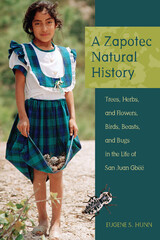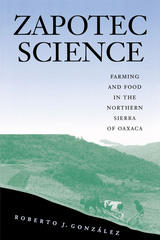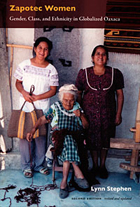3 start with Z start with Z

San Juan Gbëë is a Zapotec Indian community located in the state of Oaxaca, a region of great biological diversity. Eugene S. Hunn is a well-known anthropologist and ethnobiologist who has spent many years working in San Juan Gbëë, studying its residents and their knowledge of the local environment. Here Hunn writes sensitively and respectfully about the rich understanding of local flora and fauna that village inhabitants have acquired and transmitted over many centuries. In this village everyone, young children included, can identify and name hundreds of local plants, animals, and fungi, together with the details of their life cycles, habitat preferences, and functions in the economic, aesthetic, and spiritual lives of the town.
Part 1 of this two-part work describes the community, the subsistence farming practices of its residents, the nomenclature and classification of the local biological taxonomy, the use of plants for treating illnesses, and the ritual and decorative roles of flowers. Part 2 is available online, and includes detailed inventories of all plant, animal, and fungal categories recognized by San Juan’s people; a series of indexes; a library of more than 1,200 images illustrating the town’s plants, people, landscapes, and daily activities; and sounds of village life.

2003 — Julian Steward Award – Anthropology & Environment Section, American Anthropological Association
2002 — A CHOICE Outstanding Academic Book
How Zapotec agricultural and dietary theories and practices constitute a valid local science.
Zapotec farmers in the northern sierra of Oaxaca, Mexico, are highly successful in providing their families with abundant, nutritious food in an ecologically sustainable fashion, although the premises that guide their agricultural practices would be considered erroneous by the standards of most agronomists and botanists in the United States and Europe. In this book, Roberto González convincingly argues that in fact Zapotec agricultural and dietary theories and practices constitute a valid local science, which has had a reciprocally beneficial relationship with European and United States farming and food systems since the sixteenth century.
González bases his analysis upon direct participant observation in the farms and fields of a Zapotec village. By using the ethnographic fieldwork approach, he is able to describe and analyze the rich meanings that campesino families attach to their crops, lands, and animals. González also reviews the history of maize, sugarcane, and coffee cultivation in the Zapotec region to show how campesino farmers have intelligently and scientifically adapted their farming practices to local conditions over the course of centuries. By setting his ethnographic study of the Talea de Castro community within a historical world systems perspective, he also skillfully weighs the local impact of national and global currents ranging from Spanish colonialism to the 1910 Mexican Revolution to NAFTA. At the same time, he shows how, at the turn of the twenty-first century, the sustainable practices of "traditional" subsistence agriculture are beginning to replace the failed, unsustainable techniques of modern industrial farming in some parts of the United States and Europe.

Stephen presents new information about the weaving cooperatives women have formed over the last two decades in an attempt to gain political and cultural rights within their community and standing as independent artisans within the global market. She also addresses the place of Zapotec weaving within Mexican folk art and the significance of increased migration out of Teotitlán. The women weavers and merchants collaborated with Stephen on the research for this book, and their perspectives are key to her analysis of how gender relations have changed within rituals, weaving production and marketing, local politics, and family life. Drawing on the experiences of women in Teotitlán, Stephen considers the prospects for the political, economic, and cultural participation of other indigenous women in Mexico under the policies of economic neoliberalism which have prevailed since the 1990s.
READERS
Browse our collection.
PUBLISHERS
See BiblioVault's publisher services.
STUDENT SERVICES
Files for college accessibility offices.
UChicago Accessibility Resources
home | accessibility | search | about | contact us
BiblioVault ® 2001 - 2024
The University of Chicago Press









